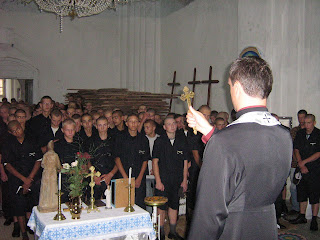A Igreja Greco-Catolica Ucraniana, que é membro da Comissão Internacional da capelania católica nas prisões, tentando cooperar com as agências relacionadas com os prisioneiros católicos sob a custódia de Portugal, realizou reuniões de trabalho de 11 a 18 de Novembro de 2010, com o padre João Gonçalves da Coordenação Nacional da Pastoral Prisional e, padre João Manuel Pedro Nogueira, Director do Sector das Capelanias Prisionais. Nessas reuniões, esteve presente o padre Constantino Panteley, que representa oficialmente o ministério pastoral na Igreja da prisão, padre Johan (Dmytro) Lubiv, OSBM responsável pelo ministério pastoral dos ucranianos na diocese de Lisboa, e padre Mykola (Maryan) Yarema, OSBM. O objectivo destas reuniões foi a troca de experiências e oportunidades para melhor servir os nossos concidadãos, que entraram em conflito com a lei e em consequência disso foram levados em custódia e condenados a uma pena de prisão em Portugal.
Bientôt en août 2011 Treizième Congrès International pour la Pastorale Catholique des Prisonniers sur tous les continents (ICCPPC) aura lieu au Cameroun. Le XIIe Congrès pour ICCPPC s’est achevé le 12 septembre 2007 à Rome.
Lors du congrès l’Eglise a exprimé sa profonde inquiétude à l’égard des besoins des prisonniers et surtout des personnes en cours d’instruction dont la culpabilité n’est pas encore prouvée. L’assemblée plénière a approuvé la résolution du Synode des évêques de l’Eglise gréco-catholique d’Ukraine de se joindre à la commission mondiale de la pastorale catholique des prisonniers.
« Nous nous réjouissons de voir chaque fois une plus grande compréhension du Synode des évêques de l’Eglise gréco-catholique d’Ukraine au sujet de la pastorale en Ukraine. Il semble que ce type de ministère soit au cœur de la spiritualité de cette Eglise tout au long de son histoire », a dit le président du Congrès. « La Commission favorisera l’enseignement et l’organisation de la formation pour faire partager aux chapelains des prisons l’expérience de chacun », a-t-il souligné.
Le congrès a appelé les conférences épiscopales de l’Eglise Catholique du monde entier à prêter attention aux grands problèmes des prisons liés à la violence, aux difficultés des enfants en conflit avec la loi, des personnes psychologiquement perturbées, des personnes âgées, des personnes dans le besoin, au nombre croissant des émigrés.
Dans la plupart des pays et même dans ceux où les fidèles de l’Eglise sont en minorité où sous pression des idéologies (Egypte, Liban, Hong-kong, Singapour, Burundi, Nigeria, Malawi, Pakistan) existe une institution d’aumoniers de prison. Des chapelains rendent visite aux prisonniers, donnent des cours. Les chefs des prisons voient que la plupart des prisonniers pris en charge par des chapelains ne retournent plus à la vie criminelle. L’Eglise participe ainsi à la resocialisation de ces personnes.
En Ukraine l’Eglise gréco-catholique d’Ukraine s’occupe de 42 institutions pénitentiaires, l’Eglise catholique romaine – de 18. Les chapelains catholiques des deux Eglises collaborent et organisent ensemble des cours et des retraites. La pastorale catholique de l’Ukraine a été représentée au congrès par le délégué de l’Eglise gréco-catholique d’Ukraine, le père Constantin Panteley et le chapelain principal des prisonniers de l’Eglise catholique romaine, le père Hryhoriy Draus.














